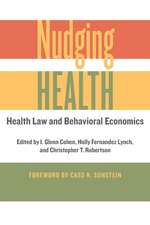Laws of Fear: Beyond the Precautionary Principle: The Seeley Lectures, cartea 6
Autor Cass R. Sunsteinen Limba Engleză Paperback – 30 mar 2005
| Toate formatele și edițiile | Preț | Express |
|---|---|---|
| Paperback (1) | 155.66 lei 22-36 zile | |
| Cambridge University Press – 30 mar 2005 | 155.66 lei 22-36 zile | |
| Hardback (1) | 693.02 lei 43-57 zile | |
| Cambridge University Press – 30 mar 2005 | 693.02 lei 43-57 zile |
Preț: 155.66 lei
Nou
Puncte Express: 233
Preț estimativ în valută:
29.79€ • 32.37$ • 25.04£
29.79€ • 32.37$ • 25.04£
Carte disponibilă
Livrare economică 31 martie-14 aprilie
Preluare comenzi: 021 569.72.76
Specificații
ISBN-13: 9780521615129
ISBN-10: 0521615127
Pagini: 248
Ilustrații: black & white illustrations
Dimensiuni: 138 x 215 x 15 mm
Greutate: 0.3 kg
Ediția:New.
Editura: Cambridge University Press
Colecția Cambridge University Press
Seria The Seeley Lectures
Locul publicării:Cambridge, United Kingdom
ISBN-10: 0521615127
Pagini: 248
Ilustrații: black & white illustrations
Dimensiuni: 138 x 215 x 15 mm
Greutate: 0.3 kg
Ediția:New.
Editura: Cambridge University Press
Colecția Cambridge University Press
Seria The Seeley Lectures
Locul publicării:Cambridge, United Kingdom
Cuprins
Acknowledgements; Introduction; Part I. Problems: 1. Precautions and paralysis; 2. Behind the precautionary principle; 3. Worst case scenarios; 4. Fear as wildfire; Part II. Solutions: 5. Reconstructing the precautionary principle - and managing fear; 6. Costs and benefits; 7. Democracy, rights, and distribution; 8. Libertarian paternalism with Richard Thaler; 9. Fear and liberty; A concluding note: fear and folly; Index.
Recenzii
'Those interested in issues of fear, danger and the law will certainly find that Sunstein presents the discussion in a highly considered and motivated manner. Consequently, this book has the potential to be a contentious addition to the body of literature currently existing on the Precautionary Principle, social fear and risk perception and the regulation thereof.' Cambrian Law Review
'… highly intelligent and stimulating book …'. The Times Literary Supplement
'Sustein's book … remains an important contribution to the increasingly pressing debate on fear, risk, and the law, and it will be read profitably by anyone interested in these issues. It also presents ideas for approaching problems in moral and political philosophy from a new perspective, thus it is likely to serve as a starting point for many future discussions in these fields.' Logical Analysis and History of Philosophy
'… an interesting piece for readers who are concerned about the perception of risk, hazards and the necessary policies to prevent panic in general. A book self-oriented not only to the mitigation of real-based risks but also to the academician assessment of under what circumstances the fear operates and becomes panic.' Korstanje Maximiliano, International Journal of Disaster Resilience in the Built Environment
'… highly intelligent and stimulating book …'. The Times Literary Supplement
'Sustein's book … remains an important contribution to the increasingly pressing debate on fear, risk, and the law, and it will be read profitably by anyone interested in these issues. It also presents ideas for approaching problems in moral and political philosophy from a new perspective, thus it is likely to serve as a starting point for many future discussions in these fields.' Logical Analysis and History of Philosophy
'… an interesting piece for readers who are concerned about the perception of risk, hazards and the necessary policies to prevent panic in general. A book self-oriented not only to the mitigation of real-based risks but also to the academician assessment of under what circumstances the fear operates and becomes panic.' Korstanje Maximiliano, International Journal of Disaster Resilience in the Built Environment
Notă biografică
Descriere
A major statement from one of the most influential political and legal theorists writing today.


























